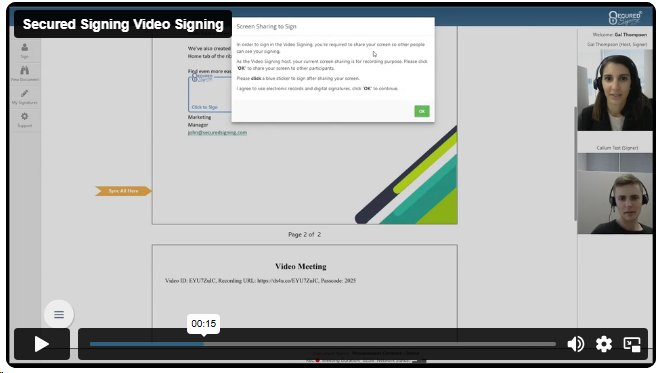We’ve been big fans of digital signing for more than 7 years, starting to use and recommend it after we got to know the team at Secured Signing in 2017. I wrote a blog about it at the time: Digital signing for lawyers – Secured Signing and LawHawk Join Forces.
In 2020, when COVID hit, lawyers were suddenly challenged to work out how to sign documents electronically, and I was asked to participate in a webinar for the New Zealand Law Society on short notice. I believe more than 3,500 lawyers attended the webinar (by far my largest audience on a webinar!). We demonstrated a Secured Signing digital signing workflow, and I involved my 10 year old daughter to show how simple it was. I mustn’t have done a very good job, as people commented that they thought it looked too hard for lawyers to learn, and I don’t believe there was any major uptake. Many lawyers instead watched each other sign documents with pen and paper via video call and swapped counterparts later.
Things are changing, though.
Read More
Topics:
Future of Law,
Legal Technology,
Law Firm Management,
Digital Signatures,
Legal Operations,
Law Firm Strategy
Like many involved in legal automation, we initially started with a focus on document automation.
This was the particular pain point we had experienced as banking and corporate lawyers ourselves, and we were looking for a way to draft complex legal documents much more quickly and with fewer errors.
When we set up LawHawk eight years ago, there weren’t many options for broader workflow automation, so most initial projects were limited to document automation. Even so, it was common for our projects to deliver 75% or more time savings when drafting individual documents, and potentially much more when delivering packages of documents. This could often translate to several hours of time savings for drafters per matter.
Read More
Topics:
Future of Law,
Document Automation,
Legal Technology,
In-House Legal,
Law Firm Management,
Digital Signatures,
Self-Service Legal Automation,
Legal Automation,
Legal Operations
The best conversations I have with law firms tend to have little to do with technology, as there are more fundamental things that need discussion first.
Technology can be a great enabler, but only if it aligns with the law firm's business model, and how the firm creates and captures value.
That’s why I'm always keen to understand what a firm does and how it charges for its services. If they are still charging by the hour, it will make little sense for them to invest in the type of solutions we specialise in delivering, which aim to remove as many hours of time from the job as possible.
If the firm's costs (mainly premises and staff) are largely fixed and they don't have a marketing strategy to get more clients for their distinctive solutions, there's a high chance with an hourly rate billing model that they could end up doing the same amount of work, for the same clients, faster and for less money! Why would the firm want or pay for automation?
Read More
Topics:
Practise of Law,
Future of Law,
Legal Technology,
Law Firm Management,
Legal Automation,
Legal Operations,
Law Firm Marketing,
Law Firm Strategy,
Law Firm Profitability,
Law Firm Pricing
In my last post, I discussed the importance of value pricing in a firm's decision to use legal technology and reap its benefits.
However, how does a firm move quickly from time billing to value pricing while avoiding the pitfalls and mistakes others have already made and which are easily avoidable?
Don't just make it up through trial and error – get external help from experts.
Resources that can help firms move to value pricing
There are a lot of pricing consultants in the market, and I've also noticed that many are also starting to position themselves as value pricing experts despite largely having built their reputations on helping firms refine hourly billing models.
If you're interested in these ideas, I recommend looking first at people who have been living and breathing value pricing since well before it was cool. Some particular people that I recommend are:
Read More
Topics:
Practise of Law,
Future of Law,
Legal Technology,
Law Firm Management,
Value Pricing,
Law Firm Strategy,
Law Firm Profitability,
Law Firm Pricing
I found a few sections in Deloitte's In-house Insights Report, “Trusted navigators in complex and challenging environments”, prepared in response to the September 2022 survey of New Zealand's in-house legal community, fascinating.
They were questions about the skills of the in-house legal profession, and in particular:
- What legal skills do you consider will be most important for you to be able to perform your role in the next 2 years and
- What non-legal skills do you consider will be most important for you to be able to perform your role in the next 2 years.
If they are skills that a lawyer needs to perform their role, then aren't they ALL legal skills?
Read More
Topics:
Future of Law,
Legal Technology,
In-House Legal,
Law Firm Management,
Legal Automation,
Legal Operations,
Law Firm Strategy
Estate planning, particularly the creation of wills and enduring powers of attorney (EPAs), is an underappreciated field requiring a lot of expertise.
Lawyers and legal executives often invest extensive hours researching, verifying, and customising clauses for wills, all while managing the heavy administrative load of gathering and inputting data into multiple documents for various individuals.
It doesn't have to be this hard, though.
Embracing technological advancements has transformed the process of will and EPA creation for modern firms wanting to adopt the most efficient processes and provide the best outcomes for their clients.
In this post, we delve into why leading industry players are now turning to software solutions for the streamlined creation of even the most intricate documents, specifically focusing on wills and EPA documents.
This article focuses on specific document automation software, not the basic functionality you get in practice management systems, which is often marketed as if it has the same capabilities.
Read More
Topics:
Future of Law,
Document Automation,
Legal Technology,
Wills,
Estates,
Law Firm Management,
Legal Automation,
Law Firm Marketing,
Law Firm Strategy,
Law Firm Profitability,
Law Firm Pricing
Looking ahead to the coming year, I think (maybe with a bit of hope thrown in) several themes will be key. This is what we will be focussing on helping our customers with, and in our own business.
Read More
Topics:
Practise of Law,
Future of Law,
Document Automation,
Legal Technology,
Law Firm Management,
Compliance,
Legal Operations,
Contract Management,
Law Firm Strategy,
Productivity
The Ministry of Business, Innovation and Employment have just released an Advance Notice of their intention to re-tender the All of Government External Legal Services contract, which expires on 22 September 2023.
The revised fee structure caught my eye.
Read More
Topics:
Future of Law,
In-House Legal,
Law Firm Management,
Legal Automation,
Matter Management,
Legal Operations,
Value Pricing
Are we too focussed on whether something is innovative?
That might seem an unusual question for me to ask, you might think. After all, haven’t I been on the Advisory Board for the College of Law’s Centre for Legal Innovation for the last five years?
Isn't a large part of what LawHawk does looking at existing processes, how they can be re-engineered, and finding new ways to work for better results?
Given how little innovation has occurred in the legal profession, don’t we want to see much more of it?
Read More
Topics:
Practise of Law,
Future of Law,
Legal Technology,
In-House Legal,
legal practice,
Law Firm Management
It’s coming up to 5 years since LawHawk launched.
Back then, nobody was really doing legal automation. Cloud technology was only just starting to emerge and, quite fairly, most firms had little to no experience of successful automation to talk about.
In the next couple of years there were a lot of press releases about firms adopting one solution or another, but surprisingly little publication of any actual results that had come from the project. Either the firm never had a plan for broader roll-out beyond a small initial team of enthusiasts, or the realities of successful legal tech project management quickly stalled things.
So five years on, I feel there are still too many people talking about what other people should be doing, without any obvious experience of having done it themselves, or offering any insights into how others can do it too. Particularly how to get started and how to overcome the inevitable obstacles that arise.
Which is why I’m pleased to be participating in LawFest 2021 on 3 March, with a panel of people who have all got first hand experience of successful delivery of legal tech projects, and who can share insights that will help others to do the same.
Read More
Topics:
Practise of Law,
Future of Law,
Legal Technology









 021 339 527
021 339 527 lawhawk@lawhawk.nz
lawhawk@lawhawk.nz








